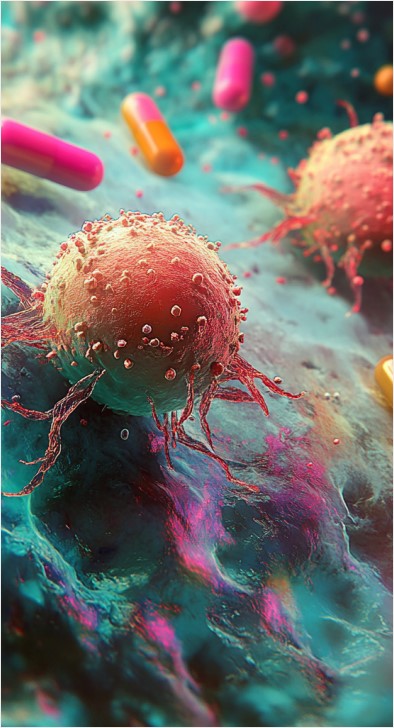- Home
- Solutions
- One-stop Services
- Drug Safety Evaluation Services
- Home
- Solutions
- By Diseases
- Nerve Cancer
- Blood Cancer
- Myeloid Proliferations and Neoplasms
- Histiocytic and Dendritic Cell Neoplasms
- B-cell Lymphoid Proliferations and Lymphomas
- B-cell Lymphoma (BCL)
- Chronic Lymphocytic Leukemia (CLL)
- Hairy Cell Leukemia (HCL)
- Waldenström Macroglobulinaemia (WM)
- Marginal Zone Lymphoma (MZL)
- Mucosa-associated Lymphoid Tissue Lymphoma (MALT)
- Follicular Lymphoma (FL)
- Mantle Cell Lymphoma (MCL)
- Diffuse Large B-cell Lymphoma (DLBCL)
- Grey Zone Lymphoma (GZL)
- Primary Central Nervous System Lymphoma (PCNSL)
- Burkitt Lymphoma (BL)
- Hodgkin's Lymphoma (HL)
- Multiple Myeloma (MM)
- B-cell Lymphoma (BCL)
- T-cell and NK-cell Lymphoid Proliferations and Lymphomas
- Stroma-derived Neoplasms of Lymphoid Tissues
- Genetic Tumor Syndromes
- Lung Cancer
- Adenosquamous Carcinoma of the Lung (ASC)
- Large Cell Neuroendocrine Carcinoma of the Lung (LCNEC)
- Salivary Gland-type Carcinoma of the Lung (SGTTL)
- Sarcomatoid Carcinoma of the Lung (SCL)
- Granular Cell Tumor (GCT) of the Lung
- Pancoast Tumors
- Bronchoalveolar Carcinoma (BAC)
- Small Cell Lung Cancer (SCLC)
- Pulmonary Adenoid Cystic Carcinoma (PACC)
- Pleuropulmonary Blastoma (PPB)
- Asbestosis
- Pulmonary Lymphomas
- Pharyngeal Cancer
- Mucous Gland Adenoma of the Lung
- Pulmonary Sarcomas
- Pulmonary Hamartomas (PHs)
- Digestive Cancer
- Anal Lymphoma
- Anal Sarcoma
- Anal Transitional Cell Carcinoma (ATCC)
- Anal Verrucous Carcinoma (AVC)
- Colon Neuroendocrine Tumor
- Extrahepatic Cholangiocarcinoma (eCCA)
- Gallbladder Neuroendocrine Carcinoma (GB-NEC)
- Gastrointestinal Carcinoid Tumor
- Gastrointestinal Stromal Tumor (GIST)
- Klatskin Tumor
- Malignant Peritoneal Mesothelioma (MPM)
- Multifocal Intrahepatic Cholangiocarcinoma (ICC)
- Peritoneal Carcinomatosis
- Pseudomyxoma Peritonei (PMP)
- Esophageal Cancer (ESCR)
- Gastric Cancer (GASC)
- Colorectal Cancer (CRC)
- Pancreatic Cancer (PNCA)
- Hepatocellular Carcinoma (HCC)
- Cholangiocarcinoma (CCA)
- Anal Squamous Cell Carcinoma (ASCC)
- Anal Adenocarcinoma
- Anal Canal Neuroendocrine Carcinoma (ANEC)
- Small Intestine Cancer
- Colon Adenocarcinoma (CAC)
- Rectal Adenocarcinoma
- Colorectal Signet Ring Cell Carcinoma (CSRCC)
- Colorectal Lymphoma
- Appendiceal Carcinoma (AC)
- Carcinoma of the Ampulla of Vater (CAV)
- Duodenal Adenocarcinoma (DA)
- Meckel's Diverticulum Carcinoma (MDC)
- Jejunal Adenocarcinoma (JA)
- Reproductive System Cancer
- Urinary System Cancer
- Renal Cell Carcinoma (RCC)
- Bladder Cancer (BLC)
- Urothelial Carcinoma (UC)
- Prostate Cancer (PC)
- Clear Cell Renal Cell Carcinoma (CCRCC)
- Urethral Cancer
- Collecting Duct Carcinoma (CDC)
- Renal Medullary Carcinoma (RMC)
- MiT Family Translocation Renal Cell Carcinomas (tRCC)
- Succinate Dehydrogenase Deficient Renal Cell Carcinoma
- Mucinous Tubular and Spindle Cell Carcinoma (MTSCC)
- Metanephric Adenoma (MA)
- Metanephric Adenofibroma (MAF)
- Metanephric Stromal Tumor (MST)
- Adult Cystic Nephroma (CN)
- Mixed Epithelial and Stroma Tumor (MEST)
- Nephroblastoma
- Renal Mesenchymal Tumors (RMTs)
- Nephrogenic Rests and Nephroblastomatosis
- Congenital Mesoblastic Nephroma (CMN)
- Sarcoma
- Breast Cancer (BC)
- Sporadic Breast Cancer (SBC)
- Bilateral Breast Cancer (BBC)
- Triple-Negative Breast Cancer (TNBC)
- Invasive Ductal Carcinoma (IDC)
- Invasive Lobular Carcinoma (ILC)
- Ductal Carcinoma in Situ (DCIS)
- Inflammatory Breast Cancer (IBC)
- Mammary Paget Disease (MPD)
- Lobular Carcinoma in Situ (LCIS)
- Breast Phyllodes Tumor
- Metaplastic Breast Cancer (MpBC)
- Tubular Breast Carcinoma
- Mucinous Breast Carcinoma (MBC)
- Papillary Carcinoma of the Breast (PCB)
- Invasive Cribriform Carcinoma (ICC)
- Medullary Breast Carcinoma (MBC)
- Breast Angiosarcoma (BA)
- Neuroendocrine Carcinoma of the Breast (NECB)
- Secretory Carcinoma of the Breast (SCB)
- Adenoid Cystic Carcinoma of the Breast (ACCB)
- Mixed Ductal and Lobular Carcinoma (mDLC)
- Male Breast Cancer (MBC)
- Metastatic Breast Cancer
- Hormone Receptor Positive Breast Cancer
- HER2-Positive Breast Cancer
- Familial Breast Cancer
- BRCA1-associated Breast Cancer
- BRCA2-associated Breast Cancer
- Li-Fraumeni Syndrome (LFS)-associated Breast Cancer
- Cowden Syndrome-associated Breast Cancer
- Skin Cancer
- Malignant Mesothelioma (MM)
- Retinoblastoma (RB)
- Thyroid Cancer
- Head and Neck Cancer (HNC)
- Nut Midline Carcinoma (NMC)
- Craniopharyngioma (CP)
- Lymphatic Malformation (LM)
- Nasopharyngeal Carcinoma (NPC)
- Adenoid Cystic Carcinoma (ACC)
- Mucoepidermoid Carcinoma (MEC)
- Salivary Duct Carcinoma (SDC)
- By Services
- By Products
- By Diseases
- About Us
- Contact Us
- Careers



 Fig.1 Use of in vitro assays for kidney toxicity de-risking including cell type used. (Troth S. P, et al., 2019)
Fig.1 Use of in vitro assays for kidney toxicity de-risking including cell type used. (Troth S. P, et al., 2019)